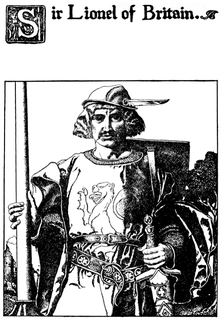Related Research Articles

Sir Lionel is the younger son of King Bors of Gaunnes and Evaine and brother of Bors the Younger in Arthurian legend since the Lancelot-Grail cycle. He is a double cousin of Lancelot and cousin of Lancelot's younger half-brother Hector de Maris. He later became the subject of one of the famous Child Ballads (#18).
Willie's Lady is Child ballad number 6 and Roud #220. The earliest known copy of the ballad is from a recitation transcribed in 1783.
"The Laily Worm and the Machrel of the Sea" is Child ballad number 36.

"Hind Horn" is a traditional English and Scottish folk ballad.
"Hind Etin" is a folk ballad existing in several variants.
King Estmere is an English and Scottish Child ballad and number 60 of 305 ballads collected by Francis James Child.
"The Fair Flower of Northumberland" is a folk ballad.
Leesome Brand is Child Ballad number 15 and Roud #3301.
The Bent Sae Brown is Child ballad 71.
Fause Foodrage is a Scottish murder ballad of the 17th or 18th century. It was first printed by Walter Scott in Minstrelsy of the Scottish Border (1802). Scott cited Elizabeth, Lady Wardlaw as the ballad's probable author.
The Lord of Lorn and the False Steward or The Lord of Lorn and the Flas Steward or The Lord of Lorn is Child ballad number 271.
"Gil Brenton" is Child ballad 5, Roud 22, existing in several variants.
Erlinton is #8 of the Child Ballads, the collection of 305 ballads from England and Scotland, and their American variants, collected by Francis James Child in the late nineteenth century. The collection was published as The English and Scottish Popular Ballads between 1882 and 1898 by Houghton Mifflin in ten volumes and later reissued in a five volume edition.
"Earl Brand" is a pseudo-historical English ballad.
"Young Andrew" is a folk song catalogued as Child ballad 48.
The Clerk’s Twa Sons o Owsenford is Child ballad 72.
Fair Mary of Wallington or Fair Lady of Wallington is Child ballad 91 and number 59 in the Roud Folk Song Index. Child lists at least seven variants of the ballad. The first variant is titled "Fair Mary of Wallington", while another variant is titled "The Bonny Early of Livingston".
Sir Cawline is Child ballad 61. A fragmentary form exists in The Percy Folio.
"The King's Dochter Lady Jean" is Child ballad No. 52.
"Young Johnstone" is Child ballad 88, a border ballad that exists in several variants. The ballad tells the story of a woman killed either by her brother or lover, depending on the variant.
References
- ↑ Francis James Child, English and Scottish Popular Ballads, "Jellon Grame"
- ↑ Francis James Child, The English and Scottish Popular Ballads, v 2, p 298, Dover Publications, New York 1965